A Newbie's Guide to Twilight Imperium
This document is a brief overview of Twilight Imperium aimed at equipping players with enough foundational knowledge to participate in their first game. This does not cover all the rules in detail, so hosts should be prepared to provide additional context and clarification come game day.
Twilight Imperium is a strategy board game set in a galaxy torn apart by the fall of the Lazax Empire. Now, multiple alien factions vie for control to become the new supreme ruler of the stars. As a player, you will take on the role of one of these factions.
Your goal is to be the first player to reach 10 victory points. When a player hits this target, the game ends, and they are crowned the new ruler of the galaxy.
The Basics
The game is played over a series of Rounds, each consisting of four Phases that follow this order:
- Strategy Phase: Players draft strategy cards that grant special abilities and determine turn order for the round.
- Action Phase: Players take actions like moving units, producing units, fighting, and using strategy cards.
- Status Phase: Players score objectives, reveal new ones, and prepare for the next round.
- Agenda Phase: Players vote on political agendas that change the game’s rules.
We'll cover these phases in more detail later. For now, let’s look at some key concepts.
Key Concepts
Your Play Area

In Twilight Imperium, your play area will look similar to the one above. This area is where you manage your empire. Here’s a quick overview of what you’ll find:
- Faction Sheet: Your faction's unit stats, abilities, and commodities are listed here.
- Tech Card Deck: These are technologies you have not researched yet.
- "Owned" Tech Cards: These are technologies you have researched and are in play.
- Planet Cards: These are the Planet Cards for planets you control.
- Command Tokens: These are used to take various actions and command your units.
- Trade Goods: A universal currency that can be used in lieu of other resources.
- Reinforcements: (offscreen) This is where all the units, command tokens, and other components that are not in play reside.
Systems and Planets
The game board represents the Galaxy, composed of System tiles, each typically containing one or more Planets. Each Planet is represented by a Planet Card and has three attributes:
- Resources: Used to acquire units and research technologies
- Influence Used to gain command tokens and cast votes during the Agenda Phase
- Tech Symbol: Allows you to bypass prerequisites when researching technologies

When you control a planet, you gain its corresponding Planet Card. You can exhaust a planet card to use one of its attributes.
Exhausting a card means flipping it face down. The card cannot be used again until it is refreshed (flipped face up) during the Status Phase.
At the start of the game, each faction starts in their Home System already controlling all of the planets in that system. As the game progresses, factions will discover new planets and engage in combat to expand their control.
Units
Units represent your faction's presence in the galaxy. All factions share the same unit types, but the stats of these units vary depending on your faction and any technologies you research.

Each unit has the following stats:
- Cost: The number of resources needed to produce the unit.
- Combat: The minimum roll on a D10 required for this unit to deal damage in combat.
- Move: The number of system tiles this unit can move in a single turn.
- Capacity: How many Fighters and Infantry the unit can carry.
Unit Types
There are 12 different types of units in the game:
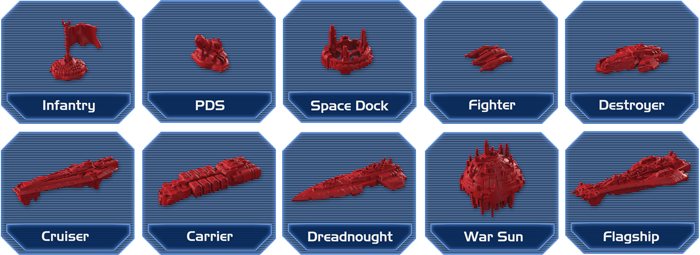
- Planet Units (placed on planets):
- Infantry: Ground troops used for planetary invasions and defense. They cannot move to other planets unless transported by a ship with capacity. You can have an unlimited number of infantry.
- PDS: A space cannon built on a planet, providing combat advantages based on your upgrades. It is a structure, so it cannot move once built, but it can be destroyed.
- Space Dock: A structure that allows you to produce units in its system during the Action Phase. It cannot move once built, but it can be destroyed.
- Ship Units: (placed in space):
- Fighters: Space-based units equivalent to infantry. They cannot move to other systems unless transported by a ship with capacity. You can have an **unlimited **number of fighters.
- Destroyers: Combat ships that can move across systems without the need for transport.
- Cruisers: Stronger than Destroyers, but they have a shorter movement range.
- Carriers: Weak in combat but can transport many units due to their high capacity.
- Dreadnought: Powerful combat ships that can also transport units.
- War Suns: Super-powerful ships capable of nearly anything. Expensive to build and unlocked via research.
- Flagship: A powerful ship that can do nearly everything. Each faction starts with one, and you are limited to one Flagship.
Units are produced during the Action Phase. New units require resources which you can get from exhausting your Planet Cards or spending trade goods
Technology
Technologies are powerful boons to your factions and units. They are represented by Tech Cards. Each player has an identical set of these cards in addition to some faction specific ones granted at the start of the game. To gain the benefits of a Tech Card, you need to research it, which can be via the Technology Strategy Card done during the Action Phase.
To research a Tech Card, you must pay resources and meet any tech prerequisites. To do this, you must have previously researched a matching Tech Card for each prerequisite symbol on the card you wishes to research.
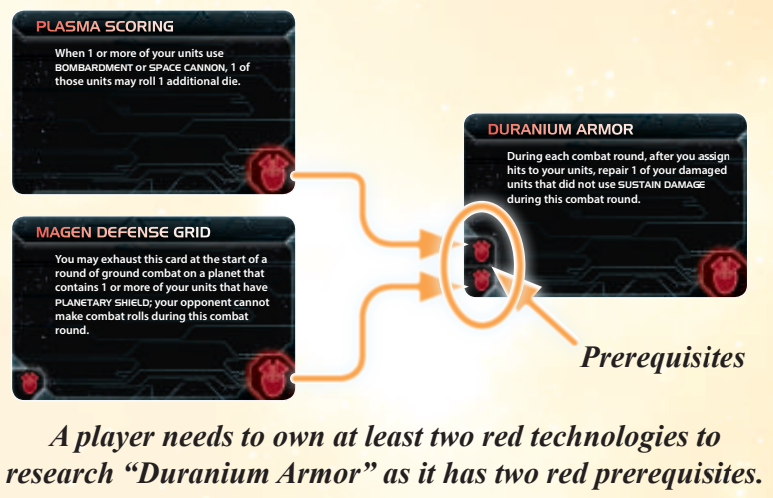
Alternatively, if you control Planets that match a tech prerequisite symbol, then you can exhaust that Planet Card to satisfy the matching symbol.
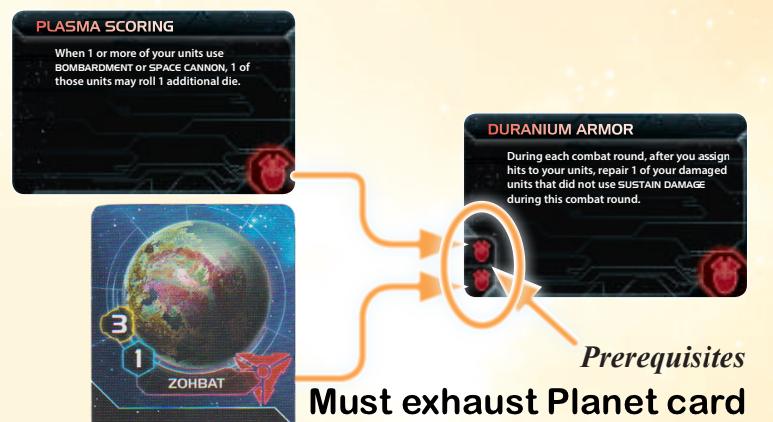
There are four possible tech symbols in the game.
Command Tokens
Command Tokens are a currency used to perform actions, command your units, and expand your fleets. Your available Command Tokens are kept in pools on your Faction Sheet.
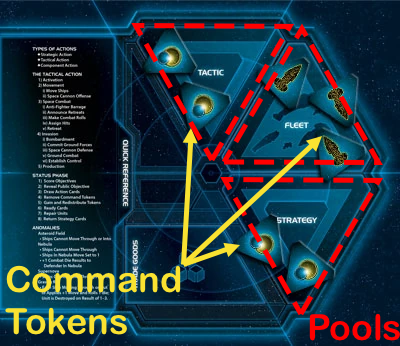
There are three pools for Command Tokens:
- Tactics Pool: Spend tokens from here to command your units to move, fight, or produce during the Action Phase.
- Strategy Pool: Spend tokens from here to take the secondary ability of another player’s Strategy Card when they activate it during the Action Phase.
- Fleet Pool: These tokens are not spent. Instead, they indicate the maximum number of non-fighter ships you can have in any system.
During the Status Phase, spent tokens are returned to your Reinforcements area. Every player gains 2 more Command Tokens and can redistribute them among their pools. Tokens cannot be redistributed again until the next Status Phase. This means anticipating where to distribute your Command Tokens as well as when to spend them are crucial to being successful in the game.
Objectives
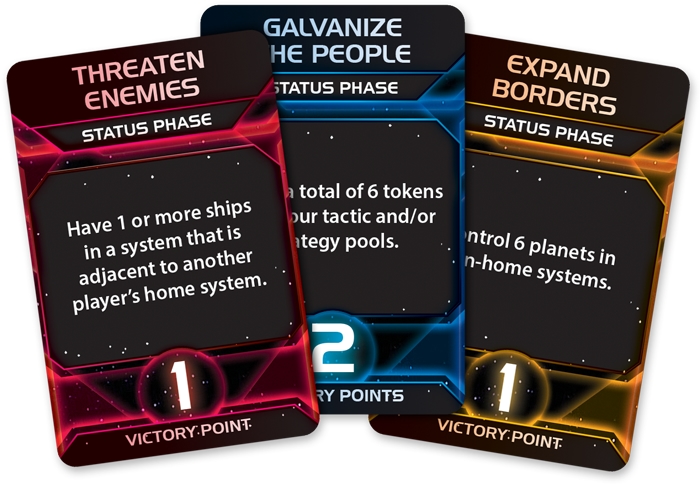
The primary way in which you'll accumulate Victory points is via completing Objectives. There are two types of Objectives:
- Public Objectives: These are available to all players and can be scored during the Status Phase. Two are revealed at the start of the game, and an additional one will be revealed as the game progresses. For the first half of the game only Stage 1 objectives will be revealed (each worth 1 VP). In the second half of the game Stage 2 objectives will appear which are worth 2 VP each.
- Secret Objectives: Each player starts the game with a secret objective known only to them and that can only be completed by them. Secret objectives are typically scored during the Status Phase though some can be scored in other phases (such as combat related ones). Each player can only have a total of 3 scored and unscored secret objectives. Additional secret objectives can be gained via the Imperial Strategy Card.
Playing the Game
Strategy Phase
The Strategy Phase is the first phase of each round and sets the stage for the entire turn. During this phase, players will draft Strategy Cards and determine the turn order for the round.
The cards are drafted starting with the Speaker and proceeding clockwise. Each player selects a Strategy Card from the pool of available cards until all players have a card. Each card not selected will have trade-goods added to them - making them more attractive options for future rounds.
Strategy Cards
Strategy Cards grant powerful abilities that influence the flow of the game and provide critical advantages. Each Strategy Card provides three key benefits:
- Primary Ability: The first player who chooses the card gains its primary ability, which is often powerful and game-changing. The player can use this ability during the Action Phase.
- Secondary Ability: During the Action Phase, when the first player uses their Primary Ability, other players can use the secondary ability of that card, but only if they spend a Command Token from their Strategy Pool to activate it. This provides a chance for players to benefit from each other's choices, but at a cost.
- Turn Order for the Round: Each Strategy Card has a number in the upper right. This determines the turn order of the player that selects said Strategy Card with lower numbers taking their turns first.
There are 8 Strategy Cards and they are as follows:
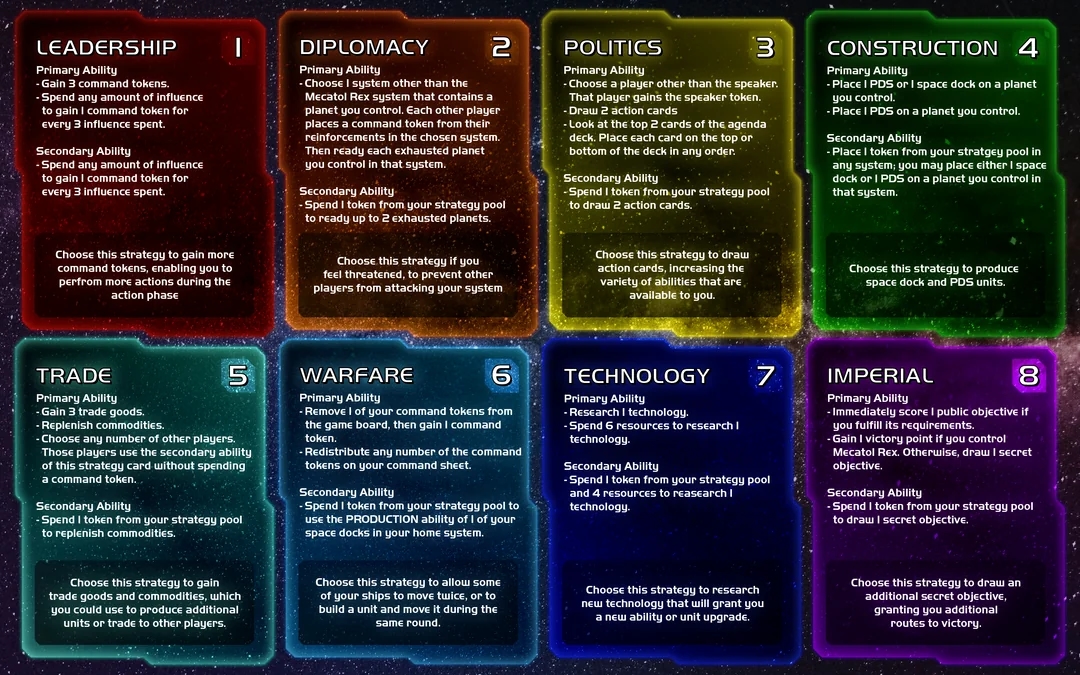
Turn Order
Whenever Strategy Cards are not in play, turn order starts with the Speaker and proceeds clockwise from there. All players return their Strategy Cards during the Status Phase. This means that for the Strategy Phase and Agenda Phase turn order is driven by the Speaker, not Strategy Cards.
The Speaker only changes when someone activates the Politics Strategy Card. At the start of the game, the Speaker is randomly determined.
Action Phase
The Action Phase is the core of the game, where players will take their turns and carry out the most critical actions that drive the game forward. Players will move their units, engage in combat, produce new units, and use their Strategy Cards.
During this phase, the turn order is driven by the order printed on the Strategy Cards with the lowest number going first. During a player's turn, they perform a single action. After each player has taken a turn, players' turns begins again in the same order. This process continues until all players have passed.
During a player's turn, they may perform one of three types of actions:
If a player cannot perform an action, then they must pass. After a player has passed, they cannot perform additional actions for the rest of the Action Phase. They can, however, still resolve the Secondary Ability of other players' Strategy Cards. A player cannot pass until they've performed their Strategic Action - this ensures all selected Strategic Cards will always be played each Action Phase, but when they're played depends on the player holding the card.
Strategic Action
When performing a Strategic Action, you activate the Primary Ability of your Strategy Card. After doing so, each other player, beginning with the one to your left and proceeding clockwise, can activate the Secondary Ability of your Strategy Card. Once everyone's had an opportunity, you exhaust your Strategy Card by flipping it face down. This indicates that Strategy Card is no longer available this round.
You cannot activate the Secondary Ability of your own Strategy Card.
Tactical Action
The tactical action is the primary method by which players produce units, move ships, and expand their territory. To perform a tactical action, the active player performs the following steps:
-
Activation: The player takes a Command Token from their Tactics Pool and places it in a system. For this turn, that system is now the Active System.
-
Movement: The active player may move any number of ships that have a sufficient move value into the Active System. The ships may come from any number of systems that do not contain one of their command tokens. Ships that have a Capacity value can transport Infantry and Fighters when moving.
Example of Movement
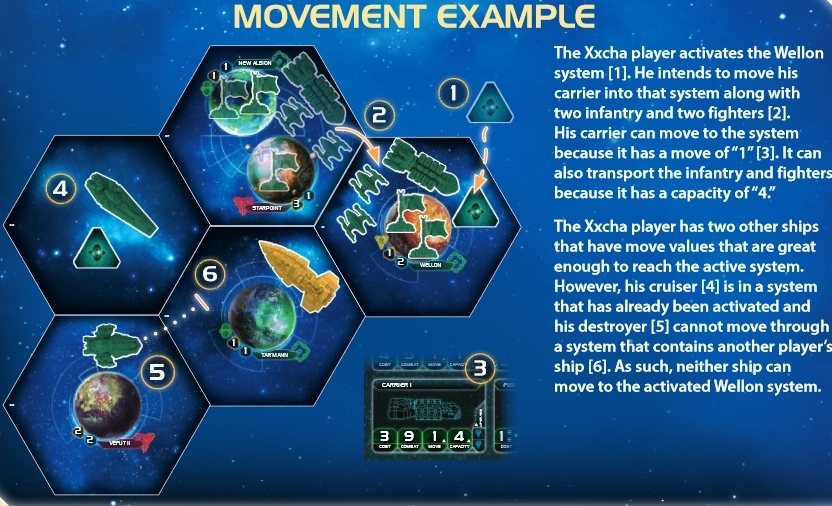 warning
warningThere's a lot more nuances about movement, but this will be explained day of. If you really want to explore this now though, then check out this video.
-
Space Combat: If two players have ships in the Active System, then those players must resolve a Space Combat. Combat is resolved via players rolling D10 dice for hits. Combat continues until either one player retreats or all of their units are destroyed.
Example of Space Combat
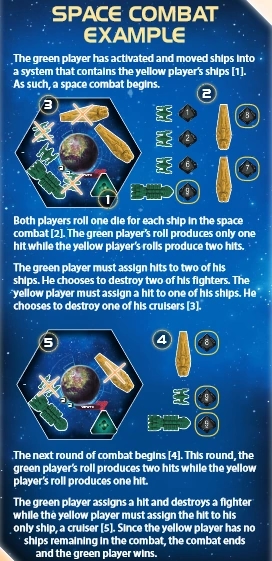 warning
warningLike Movement, Combat has more nuances that will be explained day of. If you really want to explore this now though, then check out this video.
-
Invasion: If you're still standing after Space Combat is resolved, then you can trigger a ground combat by deploying any infantry to planets. Ground combat plays out similar to Space Combat and will be explained day of.
-
Production: You can resolve the Production abilities of each of their units in the Active System. You may do this even if you did not move or fight in the Active System this round.However, your Space Docks can only produce ships if there are no enemy ships in the Active System.
Component Action
Various game components may have component actions indicated by text prefixed with Action. A Component Action is initiating one of these actions. A Component Action cannot be performed if its ability cannot be resolved. If a component action is canceled (e.g. the use of a Sabotage on an action card), that player must still perform their turn.
Status Phase
After all players have passed in the Action Phase, we enter the Status Phase. During this phase the following things happen in this order:
- Score Objectives: Following the turn order, each player may score one Public Objective and one Secret Objective. Players can only score public objectives if they still control their home system.
- Reveal Public Objective: The speaker reveals an unrevealed public objective by flipping that card faceup. They can only reveal Stage II objectives once all Stage I objectives have been revealed. The game ends if there are no more objectives to reveal at this step.
- Draw Action Cards: Following turn order, each Player draws one Action Card.
- Remove Command Tokens: All players remove all their Command Tokens from the game board and return them to their reinforcements.
- Gain and Redistribute Command Tokens: Simultaneously, all players receive two command tokens and may redistribute all of their available tokens amongst the pools on their commands sheet.
- Ready Cards: Each player readies their exhausted cards.
- Repair Units: All units with the
Sustain Damageability fully repair and are set upright. - Return Strategy Cards: All players return their Strategy Cards. Turn order now starts at the Speaker and proceeds clockwise.
Agenda Phase
The Agenda Phase only occurs after a player has claimed the planet Mecatol Rox. When this phase occurs the Speaker will reveal an Agenda card that players vote on. Players vote by exhausting Planets for their Influence, they may also pass if they do not wish to cast a vote. If there is a tie, then the Speaker decides the outcome.
After the first Agenda card is resolved, the process repeats with a second card. This means that two Agenda cards are always voted on and resolved in this phase.
Transactions and Deals
Diplomacy is a big path of the game. Throughout the course of the game you'll be making deals and bribing other players. This section explains the mechanics of doing so:
Transactions
During the Action Phase, a player can resolve one transaction with each of their neighbors. A transaction can occur at any point during the turn, even during combat. Players agree on the terms before exchanging any components, and once the components are traded, the transaction is final and cannot be undone.
In a transaction, players can exchange:
Players cannot exchange other types of cards or tokens unless a specific ability allows it.
A transaction does not have to be even. Players can trade components of unequal value, or one player can give components without receiving anything in return.
Transactions can only happen between neighbors (players with adjacent systems). However, during the Agenda Phase, all players may perform one transaction with any other player, not just their neighbors.
Deals
Deals can be made at any time between players, even if they are not neighbors. However, if a deal includes a transaction, it must follow the rules for transactions (i.e., the players involved must be neighbors).
A deal is only binding if its terms can be immediately resolved. When a deal is binding, players must adhere to the agreed terms, including any transactions. Binding deals are immediate and enforceable.
Action Cards cannot be part of a binding deal as the results of them are not instantaneous.
A deal is non-binding if its terms cannot be immediately resolved. In this case, the player is not obligated to adhere to any part of the agreement. Non-binding deals offer more flexibility and are often used to make promises or negotiate long-term benefits that may not be fulfilled immediately.
Promissory Notes
Each player has the same 5 Promissory Note cards. These cards can be a part of a transaction in order to sweeten a deal. Promissory Notes often give you a penalty or another player an advantage over you.
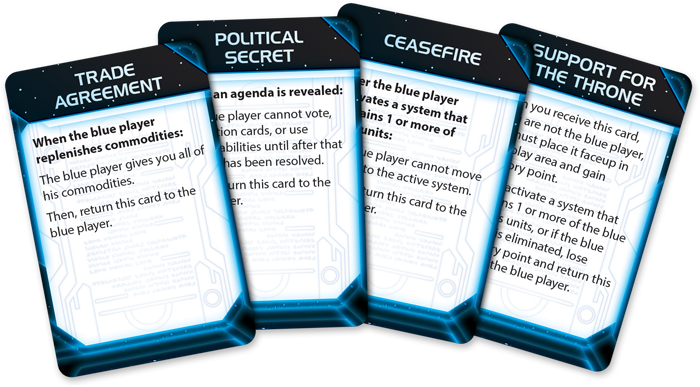
Trade Goods and Commodities
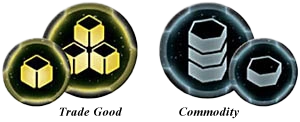
Trade Goods are a universal currency that can be used as either resources or influence. They can also be traded with other players for bribes and deals ala transactions.
Trade Goods are earned by exchanging Commodities with other players. Giving a player a Commodity turns it into a Trade Good, and vice versa. You can only hold a limited number of Commodities, but there’s no limit to how many Trade Goods you can accumulate or spend.
Action Cards
Action cards provide players with various abilities that they can resolve as described on the cards. Each player will gain one during each Status Phase. Asides that, additional action cards can be gained through the Politics Strategy card. Action cards specify when they can be played and are discared after they're played. A player may only have 7 action cards.